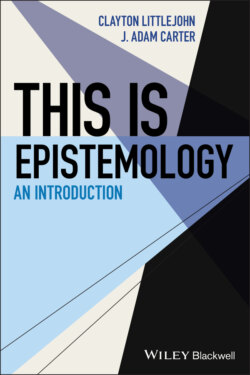Читать книгу This Is Epistemology - J. Adam Carter - Страница 22
1.7 Conclusion
Оглавление1.91 The epistemic regress problem arises when we try to identify the features that distinguish justified from unjustified beliefs. The Principle of Sufficient Difference tells us that there must be some further difference between these beliefs that accounts for the fact that the justified ones are justified and the others aren't. The natural place to look to understand this difference is to the kind of rational support these beliefs enjoy. Clear cases of justified belief are cases in which further beliefs provide strong support for those beliefs. Clear cases of unjustified belief are cases in which further beliefs lack such support. As we've seen, there is disagreement about the structure of this support. The coherentists and infinitists don't think that there are (or could be) foundational beliefs that terminate the regress, justified beliefs that can justify further beliefs without themselves being justified by any further beliefs. The foundationalists, for their part, don't think that any putative structure of justification could really justify the beliefs embedded in that structure unless there are foundational beliefs that can transmit that support to further elements in the structure via inference.
1.92 While the infinitists, coherentists, and foundationalists all have to deal with serious objections, the standard objections to foundationalism seem most clearly surmountable. In the chapters to come, we'll look at some of the different ways that the foundationalist view might be fleshed out. Most contemporary foundationalists believe that our perceptual beliefs are among the foundational beliefs, so we'll look at some debates about the nature of perceptual experience in the next chapter and discuss the significance of these debates for the foundationalist project in the chapter after that.
